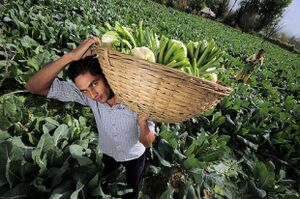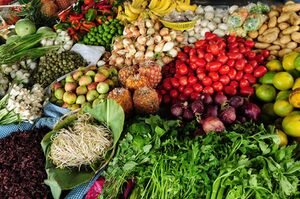Course:VANT149/2020/Capstone/Arts/Team44
Biographies

Bairong Zhu

Bairong Zhu (Preferred Name: Bairong, Undergraduate, BA, University of British Columbia) is a current student in UBC Vantage One Arts. Her father is a senior engineer in the field of environmental engineering. Under the guidance of her father, she also loves environmental engineering. Her concerns are being heightened by the increasingly serious environmental problems, and she hopes to learn expertise in the field of the environment to help reduce pollution and improve the environment in the future. She believes that the research into sustainable agricultural development is the beginning of her academic plan.
Wuyi Yang
Wuyi Yang (Preferred Name: Adeline, Undergraduate, Vantage One Bachelor of Arts, University of British Columbia) is a current student in UBC Vantage One Arts. Her father likes planting flowers in their garden in the courtyard, and he often admires the beauty of flowers in his spare time. Influenced by her father, she has a strong interest in planting, and has learned a lot about the knowledge and benefits of growing flowers over these years. To further expand her interests, she is studying the sustainability of eco-agriculture.


Xijin Xu
Xijin Xu (Preferred Name: Annalise, Undergraduate, BA, University of British Columbia) is a current student in UBC Vantage One Arts. Influenced by her experiences of traveling among natural landscapes, she has an obsessive love for the beauty of nature, pursuing the natural and cultural blend of the beauty of harmony, and is distressed by the increasingly polluted ecological environment. She is a peace lover and she likes to find warmth from ordinary life. The pastoral life she had spent with her grandparents left a deep impression on her. She hopes to promote ecological health by studying sustainable agriculture.
Yiying Sun
Yiying Sun (Preferred Name: Angel, Undergraduate, Vantage One Bachelor of Arts, University of British Columbia) is a current student in UBC Vantage One Arts. She loves traveling around the world and exploring the nature. She grew up with her grandparents in a house with a private garden. Benefited from her childhood experience, she has learned lots of farming practices and planting skills from her grandparents. Currently, she is committed to explore the relationship between the support of university students on Indigenous food practices and the development of Canadian sustainable agriculture.
.
.
Academic Poster: Exploring Sustainable Agriculture & Indigenous Food Practices
This is our Academic poster for our research project titled "exploring sustainable agriculture & Indigenous food practices" that we hope will introduce you in attending our presentation on Monday!

Introduction
Many researchers claim that the green revolution, which refers to a set of agricultural initiatives to increase productivity by using technology and chemical agricultural products, has caused a complex impact on ecological environment (Spiegelaar, Tsuji & Oelbermann, 2013; Massicotte & Kelly-Bisson, 2019). As proof, crop biodiversity, mainly referring to “the number and diversity of species used by farmers in their cultivation activities”, is rapidly decreasing because “fewer cultivars occupy increasingly larger areas and provide more of the human diet” (Brookfield & Padoch, 1994, p.8).
However, it seems that Indigenous food practices provide a direction for the future development of sustainable agriculture. Indigenous food practices reflect ecological values by following the natural laws to grow crops suitable for local soil and climatic conditions in a lower-mechanized way, and sustainable agriculture reflects the coordination and balance between ecology and social reality. Some researchers point out that Indigenous knowledges contribute to the rational use of resources and the provision of healthy food while pursuing economic development, by flexibly using or modifying cropping patterns or using crops as soil fertility management tools, for example (Rudolph & McLachlan, 2013; Moyo, 2009).
Our research question is “how can university students support Indigenous food practices to promote sustainable agriculture in all of Canada”. Since there is no research showing how university students can help develop sustainable agriculture, in order to fill in this gap in the field of sustainable agriculture, the purpose of this project is to investigate the acceptance and application of the concept of agricultural sustainability by the international students studying at a Canadian university in their daily lives. We hope this research can inspire university students to think further about the potential advantages of Indigenous agricultural production, and contribute to sustainable agriculture in possible ways.
Method
Design
- Many researchers claim that the green revolution, quantitative research methods
- Many researchers claim that the green revolution, a 10-minute anonymous questionnaire regarding agricultural sustainability and Indigenous food practices to complete in about two weeks, including the information, consent and debrief forms
- Many researchers claim that the green revolution, data cleaning and analysis by using graphic representations and descriptive statistics
Participants
This research project was ONLY open to current UBC VANT 149 students, aged 18 or over.
48 participants were finally involved in the project.

Materials
- Many researchers claim that the green revolution, The questionnaire was created by the researchers through Qualtrics.
- Many researchers claim that the green revolution, The information form conveyed the study purpose and expected implementation of this project to participants.
- Many researchers claim that the green revolution, The consent form was meant to inform the participants of their rights and the terms of the survey, and then to get their consent of participating in this study.
- Many researchers claim that the green revolution, The debrief form was to supplement or emphasize important information and thank all the participants for their participation.
- Many researchers claim that the green revolution, Microsoft Excel was used for statistical organization and graph making.
Procedure
The participants were expected to carefully read the information form, and sign the consent form before answering the survey questions. The debrief form were offered after the questionnaire was finished. The data collection lasted from June 15 to June 25, 2020. All collected data were stored in the researchers’ password protected laptops, and will be completely destroyed in December 2020 ( 6 months after data collection). Microsoft Excel was used for data cleaning and analysis in the way of formatting, graphing, etc. UBC Vantage One Capstone Conference will be held online on July 14-15, 2020 to report the research findings.
Results
In figure 1, the bar chart shows that school courses account for the largest proportion (37%) of the given channels of students acquiring sustainable agricultural knowledge,which is followed by social media (31%). The rates of learning through school courses and social media are significantly higher than those of other channels. Family and friends provide weaker help, making up 11% and 13% respectively. Nobody has never learned about sustainable agriculture.
In figure 2, the bar chart illustrates that buying from local farmers’ markets is the most popular way (27.03%), while taking sustainability courses is much less popular (11.49%) despite that school courses provide the majority help for the students to learn about sustainability. Eating organic food, choosing locally grown products and reducing demand for non-seasonal food are some common choices, with similar percentages at 19.59%,18.34% and 16.89% each.
Discussion

The results (figure 1) show that students obtain their understanding of sustainable agriculture through various channels, of which school courses and social media play most important roles. We can infer that Canadian university courses pay much attention on cultivating students’ sustainable awareness, and social media exert a subtle influence on the youth’s minds. In the future, students’ understanding of sustainable agriculture can be expected to be enhanced through education reinforcement and social media publicity. On the other hand, it can be seen (from figure 2) that buying from local farmers’ markets is the most popular supportive approach among UBC VANT149 students, which means that students tend to help develop agricultural sustainability on the basis of the convenience of life. In the future, sustainable agricultural products can be encouraged to enter the markets around universities to a larger extent in order to expand market sales and make it easier for students to purchase. Researchers can also make further investigations on the market sales of different agricultural products to provide data for possible adjustments in production process. Although school courses have greatly helped students learn about sustainability, attending relevant courses seems not very popular. We speculate that the popularity of sustainability courses may be affected by various factors such as students’ university majors, the difficulty of the subjects, and the amount of homework. It is worth further exploring related reasons for the courses improvement.
Existing research has pointed out that agricultural development is “not only in the adoption of Western farming techniques but also in their utilisation of indigenous knowledge” (Moyo, 2009, p.359). A number of urban agriculture institutions have initiated cooperation with Indigenous communities to discuss ways of improving major food systems and ecological environment (Isaac et al., 2018). This research helps to study the younger generation’s views and actions on agricultural sustainability which have never been studied before, and provides a reference for the future implementation of related policies or social measures. After participating in this survey, the participants may better reflect on the significance of Indigenous food practices on agricultural sustainability. Indigenous or local farmers could also benefit from this research because it may help them to attract more social attention and support.
References
Brookfield, H., & Padoch, C. (1994). Appreciating agrodiversity: A look at the dynamism and diversity of indigenous farming practices. Environment, 36(5), 6. Retrieved from http://ezproxy.library.ubc.ca/login?url=https://search-proquest-com.ezproxy.library.ubc.ca/docview/224024295?accountid=14656
Isaac, M., Isakson, S., Dale, B., Levkoe, C., Hargreaves, S., Méndez, V., Wittman, H., Hammelman, C., Langill, J., Martin, A., Nelson, E., Ekers, M., Borden, K., Gagliardi, S., Buchanan, S., Archibald, S., & Gálvez Ciani, A. (2018). Agroecology in canada: Towards an integration of agroecological practice, movement, and science. Sustainability, 10(9), 3299. doi:10.3390/su10093299
Rudolph, K. R., & McLachlan, S. M. (2013). Seeking Indigenous food sovereignty: origins of and responses to the food crisis in northern Manitoba, Canada. Local Environment, 18(9), 1079-1098.
Massicotte, M. J., & Kelly-Bisson, C. (2019). What’s wrong with permaculture design courses? Brazilian lessons for agroecological movement-building in Canada. Agriculture and Human Values, 36(3), 581-594.
Spiegelaar, N., Tsuji, L., & Oelbermann, M. (2013). The potential use of agroforestry community gardens as a sustainable import-substitution strategy for enhancing food security in subarctic ontario, canada. Sustainability, 5(9), 4057-4075. doi:10.3390/su5094057
Moyo, B. H. Z. (2009). Indigenous knowledge-based farming practices: A setting for the contestation of modernity, development and progress. Scottish Geographical Journal: Glasgow Geography Centenary, 125(3-4), 353-360. doi:10.1080/14702540903364385